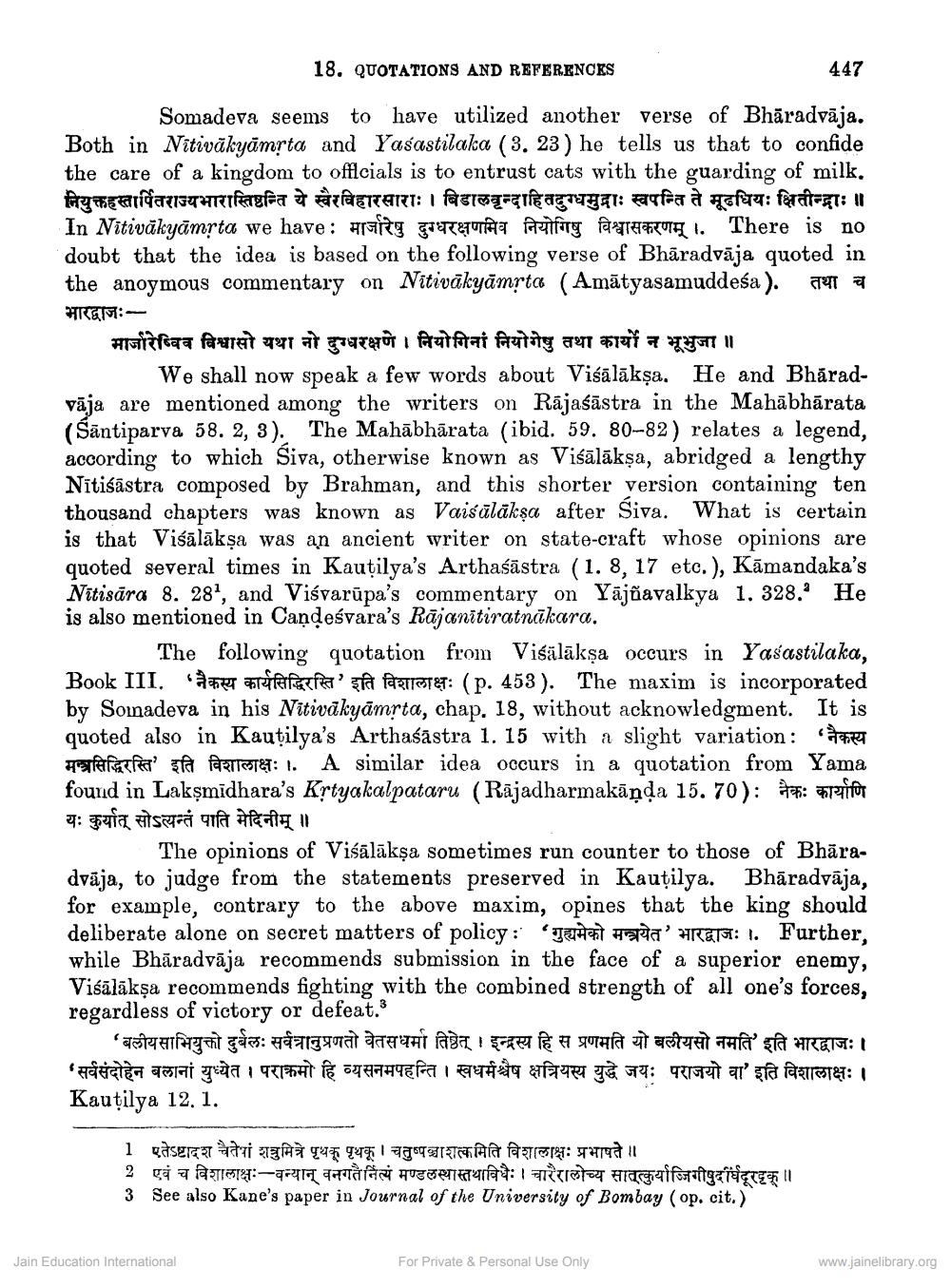________________
18. QUOTATIONS AND REFERENCES
447
Somadeva seems to have utilized another verse of Bhāradvāja. Both in Nitivãkyāmrta and Yasastilaka (3, 23) he tells us that to confide the care of a kingdom to officials is to entrust cats with the guarding of milk. नियुक्तहस्तापितराज्यभारास्तिष्ठन्ति ये स्वैरविहारसाराः। बिडालवृन्दाहितदुग्धमुद्राः स्वपन्ति ते मूढधियः क्षितीन्द्राः॥ In Nitivākyamrta we have : मार्जारेषु दुग्धरक्षणमिव नियोगिषु विश्वासकरणम् ।. There is no doubt that the idea is based on the following verse of Bhāradvāja quoted in the anoymous commentary on Nitivákyāmộta (Amātyasamuddeśa). HRT:__ मार्जारेष्विव विश्वासो यथा नो दुग्धरक्षणे । नियोगिनां नियोगेषु तथा कार्यों न भूभुजा ॥
We shall now speak a few words about Viśālākṣa. He and Bhāradvāja are mentioned among the writers on Räjaśāstra in the Mahābhārata (Santiparva 58.2, 3). The Mahābhārata (ibid. 59. 80-82) relates a legend, according to which Siva, otherwise known as Viśālākşa, abridged a lengthy Nītiśāstra composed by Brahman, and this shorter version containing ten thousand chapters was known as Vaisālākṣa after Siva. What is certain is that Viśālākṣa was an ancient writer on state-craft whose opinions are quoted several times in Kautilya's Arthaśāstra (1.8, 17 etc.), Kāmandaka's Nitisāra 8. 281, and Visvarūpa's commentary on Yājāavalkya 1. 328. He is also mentioned in Candesvara's Rājanitiratnākara.
The following quotation from Viśālākṣa occurs in Yasastilaka, Book III. Frakt fremefecteaza fatica: (p. 453). The maxim is incorporated by Somnadeva in his Nitivakyāmrta, chap. 18, without acknowledgment. It is quoted also in Kautilya's Arthaśāstra 1. 15 with a slight variation: opet मन्त्रसिद्धिरस्ति' इति विशालाक्षः ।. A similar idea occurs in a quotation from Yama found in Lakşmīdhara's Krtyakalpataru (Rājadharmakāņda 15. 70): 42: Frifor यः कुर्यात् सोऽत्यन्तं पाति मेदिनीम् ॥
The opinions of Viśālākṣa sometimes run counter to those of Bhāradvāja, to judge from the statements preserved in Kautilya. Bhāradvāja, for example, contrary to the above maxim, opines that the king should deliberate alone on secret matters of policy: Ta p a' HREST: I. Further, while Bhāradvāja recommends submission in the face of a superior enemy, Viśālāksa recommends fighting with the combined strength of all one's forces, regardless of victory or defeat.
___'बलीयसाभियुक्तो दुर्बलः सर्वत्रानुप्रणतो वेतसधर्मा तिष्ठेत् । इन्द्रस्य हि स प्रणमति यो बलीयसो नमति' इति भारद्वाजः। 'सर्वसंदोहेन बलानां युध्येत । पराक्रमो हि व्यसनमपहन्ति । खधर्मश्चैष क्षत्रियस्य युद्धे जयः पराजयो वा' इति विशालाक्षः । Kautilya 12.1.
1 एतेऽष्टादश चैतेषां शत्रुमित्रे पृथक् पृथकू । चतुष्पञ्चाशत्कमिति विशालाक्षः प्रभाषते ॥ 2 एवं च विशालाक्षः-वन्यान् वनगतैर्नित्यं मण्डलस्थास्तथाविधैः । चारैरालोच्य सातत्कुर्याज्जिगीषुदीर्घदूरदृक् ।। 3 See also Kane's paper in Journal of the University of Bombay (op. cit.)
Jain Education International
For Private & Personal Use Only
www.jainelibrary.org




